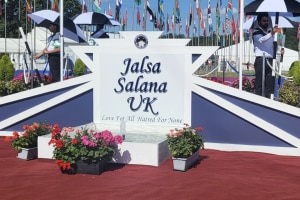
The United Nations Educational, Scientific and Cultural Organization (UNESCO) had the honour of hosting His Holiness Hazrat Mirza Masroor Ahmad (aba), Worldwide Head of the Ahmadiyya Muslim Community earlier today. The Review of Religions presents a brief summary of some of the assailant points from His Holiness’ historic address. The full transcript for this speech can be found under the article , Islamic Principles on Education and Serving Humanity.
After expressing his sincere gratitude to the guests for accepting the invitation to listen to a religious leader, His Holiness commended the objectives and important role of UNESCO in promoting peace in the world, establishing human rights and improving the conditions of the poor.
Allah – Lord of all the worlds
His Holiness explained that the Islamic teachings instructs Muslims to promote peace and welfare for the whole of mankind. Quoting from the opening chapter of the Holy Qur’an, His Holiness mentioned that God Almighty refers to Himself as ‘Lord of all the worlds’. Hence, God Almighty is the ‘Provider and Sustainer’ of everyone, of all human beings, including those who deny the very existence of God.
In reflection of these divine attributes, God Almighty has instructed Muslims to also show compassion and sympathy to all of His people regardless of their creed, race or colour. Muslims are commanded that they should always be kind and empathetic to the needs of others.
Prophet Muhammad (sa), the Founder of Islam, was sent to this world as a mercy for the whole of mankind. He initially preached to people in Mecca about the existence of God, and in return, they bitterly persecuted him and his followers. After enduring extreme hardship for 13 years, without any retaliation, he migrated from his homeland to another city, Medina. In Medina, he entered a peace treaty with the Jews, Christians and other residents of Mecca. Subsequently, he was chosen to be the leader of the state and he established a most comprehensive and magnificent charter of human rights in Medina.

The Noble Character of Prophet Muhammad (sa)
Highlighting some aspects from the exemplary life and character of the founder of Islam, His Holiness mentioned that Prophet Muhammad (sa) established impartial judiciary on the principal that everyone is the same in the eyes of the law and eradicated tribalism and nepotism with his deeds and actions.
In regards to improving the society, he established an excellent system of education for all and put special measures in place for the education of orphans and the vulnerable members of society. His objective was to empower the weak members of the society to help them gain self-sufficiency. Among the many other measures he took for the advancement of society was the system of taxation to alleviate the suffering of the poor and provide social support; establishing a court of conduct for trade and to define financial ethics; abolishment of slavery; public sanitation and raising awareness of personal hygiene and physical health; establishing a system of consensus to recognise the needs of the society, thus paving the way for astonishing individual and collective progress.
His Holiness mentioned how Prophet Muhammad (sa) championed the timeless charter of freedom of expression and freedom of speech. By his commandments and actions, he raised awareness that other people’s feelings should not be hurt and forbade criticising other religions. However, it was regrettable that in the recent years mutual respect has declined in the name of freedom of expression and entertainment. Even the founders of religions are derided and mocked which not only upsets the feeling of others but also threatens the peace and unity of the society.

Education – The Key to a Successful Society
His Holiness spoke about how Islam is often criticised for not safeguarding the rights of women, however nothing could be further from truth. In fact, Islam eradicated all forms of discriminations against women and placed great emphasis on the education of women.
Presenting the example of women belonging to the Ahmadiyya Muslim Community, His Holiness mentioned that women are serving as doctors, teachers, architects and engineers and serving humanity. Ahmadi women have equal access to education and in the developing world, the literacy rate amongst Ahmadi women is 99%.
Another criticism levelled against Islam is that it is a backward and archaic religion which does not promote intellectual advancement. His Holiness explained that this allegation was completely baseless. In fact, God Almighty commands Muslims in the Holy Qur’an to pray to God to increase them in knowledge. Islam promotes learning and advancement of knowledge.
His Holiness then presented various examples form Islamic history of notable Muslim intellectuals, philosophers, inventors and physicians. The first Muslim Nobel laureate Professor Abdus Salam belonged to the Ahmadiyya Muslim Community and he used to take inspiration for his research from the Holy Qur’an. He said that there are more than 750 versus in the Holy Qur’an which are related to the universe.
In conclusion, His Holiness mentioned that Islam teaches that spiritual advancement is instinctively linked to serving humanity; spiritual progress therefore cannot be complete with acts of worship alone. It is in light of this very principle that the Ahmadiyya Muslim Community continues to establish schools, hospitals and clinics in some of the deprived communities of the world, without any form of discrimination.
His Holiness explained that when basic human needs are met, it will end frustration and resentment which ultimately breeds extremism. Thus, true peace can be achieved by eliminating poverty and destitution from the world.




Add Comment